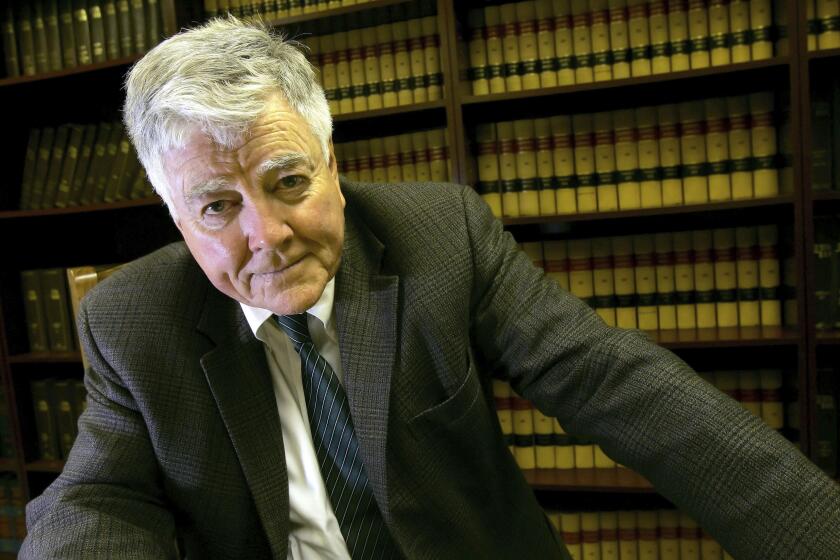Islamic Debate Surrounds Mideast Suicide Bombers
Haitham Nasser is very happy with his life in Lebanon. The 30-year-old has three children, a university degree in journalism and a comfortable home. But Nasser is every Israeli’s nightmare: a man who wants nothing more than to strap explosives on his chest, slip into the Jewish state and blow himself up, taking with him as many of the enemy as possible.
Nasser’s motivation is political, but his justification is religious. A devout Muslim, he believes that his sacrifice would be an act of martyrdom assuring automatic entry to heaven, and so he is frustrated that the military leaders of the radical Hezbollah militia have allowed him to fight but not become a bomber.
“I am ready now, tomorrow and every time because we have territory occupied by Israel,” he said in a telephone interview arranged by Hezbollah. “We are believers, deep believers.”
But even believers disagree on whether such acts lead to salvation or damnation. Although the concept of martyrdom is promoted by many religious and hard-line political leaders as they recruit bombers, two of the region’s highest religious authorities have recently issued statements that question the legitimacy of the practice. One called it haram, or a sin, and the other said it is only permissible when aimed at combatants, not civilians.
“As for the method by which a person kills himself among the enemy . . . I do not know it to have justification in the Sharia,” said the supreme religious leader of Saudi Arabia, Sheik Abdul Aziz bin Abdullah al Sheik, speaking of Islamic law. “I fear that it is considered suicide.”
That fatwa, or religious edict, printed in a Saudi newspaper at the end of April, was followed a few weeks later by comments from one of the most influential doctrinal authorities in the Sunni Muslim world, Mohammed Sayed Tantawi.
“If a person blows himself up, as in operations that Palestinian youths carry out against those they are fighting, then he is a martyr,” Tantawi said in comments published in Egypt’s semiofficial newspaper, Al Ahram. “But if he explodes himself among babies or women or old people who are not fighting the war, then he is not considered a martyr.”
The distinction is an especially emotional point for Muslims because their faith is unforgiving about suicide. Those who take their own lives are cast out from the religion, denied burial in a Muslim cemetery and condemned to eternal damnation.
“Do not kill yourselves, for Allah is compassionate toward you. Whoever does so, in transgression, and wrongfully, we shall roast in a fire,” reads one verse in the Koran.
As a result, many have looked to the comments of one of Islam’s most influential scholars, Sheik Yousef al Qaradawi, a moderate Egyptian cleric based in Qatar who upheld the practice.
“They are not suicide operations,” the sheik told the Qatari newspaper Al Raya in April. “These are heroic martyrdom operations, and the heroes who carry them out don’t embark on this action out of hopelessness and despair but are driven by an overwhelming desire to cast terror and fear into the hearts of the oppressors.”
Like many religions, Islam has no one authoritative voice, so there is not one person or body to resolve the debate. Not only are there the two major branches, Sunni and Shiite, which split in the 7th century and differ in doctrine, religious law and theology, but each Muslim is theoretically free to follow his own sage.
As a result, there is a great deal of theological hairsplitting taking place, with proponents focusing on the motivation, and critics on the act itself.
In the middle is an Arab public that strongly supports the Palestinians in their fight with Israel and has generally come to accept the practice as necessary. But this support rests on a fragile foundation, leading proponents to lash out at anyone, even a respected religious leader, who takes an opposing view.
“What was said against the suicide operations was meant to undermine the anti-Israeli struggle,” Hezbollah cleric Sheik Mohammed Hussein Fadlallah charged on the group’s Web site shortly after Tantawi’s statements were published. “It is the duty of all Muslims to engage in Islamic jihad [holy war] if it ensures the ultimate goal, which consists in inflicting losses on the enemy.”
Yet even Hezbollah had to engage in a bit of theological sleight-of-hand on Tantawi’s main point, which is not in dispute: that blowing up innocent civilians does not make one a martyr. To justify attacks like the bombing May 18 that left six dead outside a shopping center in the Israeli coastal city of Netanya, some clerics argue that all Israeli citizens--except, perhaps, children--are fair game because the Jewish state is in effect a military camp.
“If it were anywhere else but Israel, [Tantawi’s] words would be fully implemented, but not in Israel, because its society is a military barrack,” said Hezbollah cleric Sheik Afif Naboulsi.
The Islamic community neither invented nor has a monopoly on the practice of suicide attacks. During World War II, the Japanese military deployed kamikaze pilots who divebombed ships. In Sri Lanka, the Liberation Tigers of Tamil Eelam created special suicide units in its fight for a separate Tamil state.
Terrorism experts say that suicide attacks are especially effective. Practically, they are cheap to carry out and are very difficult to stop. There is no need for the complexities of organizing an escape route after the attack, and there is very little chance of the guerrilla surviving and being interrogated. Psychologically, the practice is unnerving for adversaries.
“This is part of a resistance plan that has its psychological as well as material effects,” said Osama Hamdan, the Lebanon-based representative of the militant Islamic group Hamas, which claimed responsibility for outfitting and training Mahmoud Ahmed Marmash for the attack in Netanya. “The psychological effect can be seen from the Palestinian side that the people are ready to make enormous sacrifices to regain their rights.”
Suicide bombings became inextricably linked with the struggle between the Arab world and Israel in 1983. At the time, Hezbollah decided to include the tactic in its fight against Israeli occupation of southern Lebanon.
Initially, there was internal dissension because some clerics felt that it was anathema to Islam. Because Hezbollah is affiliated with the Shiite arm of the faith, its leaders turned to Shiite-dominated Iran for a religious decision. The answer was predetermined because Iran, during its war with Iraq, had sent young troops into suicide missions, blessing them as martyrs before sending them out to die.
“They asked if the operation is legal or illegal and were assured it was permissible,” said Diaa Rashwan, a researcher on Islamic militants with the Al Ahram Center for Political and Strategic Studies in Cairo.
The religious basis for the decision, he said, involved the death of Hussein, the grandson of the prophet Muhammad and a revered figure in Shiite Islam. He was killed in battle against the Umayyad clan in AD 680, fighting what he saw as an unjust rule over Islam.
When warned that his small band of fighters was no match for the thousand-strong army, Hussein said, “O people, the Apostle of God said during his life, ‘He who sees an oppressive ruler violating the sanctions of God, reviling the covenant of God--and does not show zeal against him in word or deed, God would surely cause him to enter his abode in the fire.’ ”
In essence, the argument went that going into battle knowing that death is certain is not only permissible but also required in the appropriate circumstance. Supporters dismiss the distinction of dying by one’s own hand as irrelevant.
Martyrdom is an enticing reward for believers who are promised eternal life in paradise, permission to see the face of Allah, the loving kindness of 72 young virgins who will serve each martyr in heaven and the privilege to promise 70 relatives eternity in heaven.
“Dear family and friends! I write this will with tears in my eyes and sadness in my heart,” wrote Hisham Ismail Abdel Rahman Hamed, a suicide attacker who blew himself up in November 1994, killing nine people, including four Palestinians. “I want to tell you that I am leaving and ask for your forgiveness because I decided to see Allah today and this meeting is by all means more important than staying alive on this earth.”
The issue continues to divide Muslim scholars around the world.
“It is a blessed act to struggle against injustice and even to give your life,” said Muzammil H. Siddiqi, director of the Islamic Society of Orange County. The prophet Muhammad, he said, declared that whoever died to protect life, land, honor or religion would be blessed as a martyr. Siddiqi, however, cautioned against “generalizing” the enemy to include all Israelis.
Khaled Abou el Fadl, a UCLA professor of Islamic law, said the key issue is what he called the indiscriminate nature of the bombing attacks. He criticized as immoral bombing attacks that don’t discriminate between Israeli pacifists and belligerents, between military personnel or those capable of waging war and children and the elderly.
While he criticized the Israeli government’s treatment of Palestinians, he also said that the Koranic verse 5:8 explicitly tells believers: “Let not a people’s enmity toward you incite you to act contrary to justice.”
“If one truly believes that Islam is a humane message, Muslims must not allow themselves to be dragged, because of political expediency, into the moral lower hand,” Fadl said. “It is imperative that Muslims who face immorality and injustice remain moral, as the Koran commands.”
As the theological debate goes on, it appears that the bombings will as well. On Tuesday, Hamdan went live on television in Lebanon and announced plans for 24 more attacks.
“Four remain, then there will be 10, and another 10,” he said in a speech broadcast on Hezbollah’s Al Manar television station.
In a telephone interview, Hamdan emphasized politics, not religion: “When the Palestinian youth sees that aggression and terrorism is taking place against his people, when he sees the formidable Israeli military machine killing his people, when he sees a suspicious silence on behalf of the international community with regards to what is happening to his people--then it is easy to find hundreds, perhaps thousands, of those who are willing to commit such operations.”
*
Times staff writer Teresa Watanabe in Los Angeles contributed to this report.
More to Read
Start your day right
Sign up for Essential California for news, features and recommendations from the L.A. Times and beyond in your inbox six days a week.
You may occasionally receive promotional content from the Los Angeles Times.






